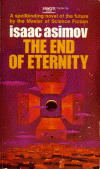This book makes Back to the Future look like child’s play. Considering the publish date of this novel, Isaac Asimov proves that he is ahead of his time even today. I have not really read many time-travel intesive books but Hollywood can’t compare to the master of Science Fiction. This was a rather short read for me as I had just finished the Lord of the Rings trilogy. The pace of the book is a bit slow at the beginning but picks up quickly toward the end. I enjoyed the time perspective change from the main character and found it to be rather unique. If you are an Asimov fan and haven’t read this book, you are cheating yourself out of a good read.
The End of Eternity by Isaac Asimov
1 thought on “The End of Eternity by Isaac Asimov”
Leave a Reply
This site uses Akismet to reduce spam. Learn how your comment data is processed.
Related Post
Manta’s Gift by Timothy ZahnManta’s Gift by Timothy Zahn
It has been a while since I have read anything by Timothy Zahn. I loved his Star Wars Thrawn Trilogy and Hand of Thrawn Duology. I also enjoyed the Conquerors’ Trilogy. I’d like to go back and re-read those sometime in the future, but for now I’m focusing on chipping away at my collection of books I haven’t read yet. I was very pleased at how well Zahn developed the Zhirrzh in the Conquerors’ Trilogy, so I was curious to see how well he does here in Manta’s Gift.
The Qanska are not the typical aliens you would expect so see in a Sci-Fi novel. They look like huge manta rays flying through the various levels of ever thicker atmosphere in Jupiter. The vast majority of aliens that I have read about have been humanoid. The ones that are not humanoid are usually portrayed as monsters (Starship Troopers), or there is a huge communication gap. Zahn challenges this stereotype and succeeds in describing a completely unique and intelligent alien race.
(more…)
Humans to become immortal cyborgs within 20 years?Humans to become immortal cyborgs within 20 years?
About a year an a half ago, I reviewed The Age of Spiritual Machines by Ray Kurzweil. I never did get around to reading his slightly newer book, The Singularity is Near. I just ran across an article that quotes him as saying
I and many other scientists now believe that in around 20 years we will have the means to reprogram our bodies’ stone-age software so we can halt, then reverse, aging. Then nanotechnology will let us live for ever.
He goes on to describe a number of medical advancements that seem unbelievable. He doesn’t really expand on how many people, or rather WHO will have access to this technology. We can’t very well have billions of immortal cyborgs running around for eternity, now can we? I think that those denied immortality, or at least extended life-spans, would wage war against those that would keep the technology for themselves.
Credit: Telegraph via Geekologie
Note: For those of you not familiar with Geekolgie, be sure to check that blog out. I added it to my newsreader about 2 months ago and it keeps me entertained every day!
Gold, The Final Science Fiction Collection – Isaac AsimovGold, The Final Science Fiction Collection – Isaac Asimov
In 1992, the year of his death, Isaac Asimov was awarded the Hugo Award for best novella for writing Gold. This story, along with many others was published in 1995. Along with 14 other short stories, there are collections of essays called “On Science Fiction,” and “Writing Science Fiction.” Interestingly enough, I found the essays much more interesting than the stories themselves. I think this is partly because I have read a TON of his fiction, but haven’t got around to reading his non-fiction. I’ll give a brief overview of the essays, saving the stories for later. (more…)



I agree that the book was a little slow-moving at the beginning, but I appreciated that the storyline and details of the main concept of time travel were laid out so well…otherwise it would have been impossible to understand what was going on at the end. This was an excellent sci-fi read, and a little bit of a love story as well.